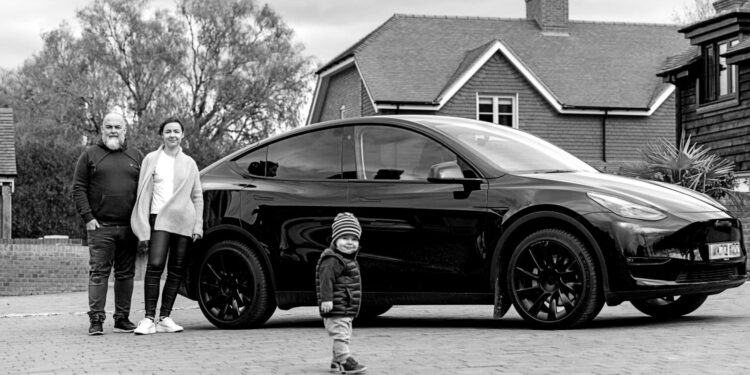When Lee Stuart was locked out of his rented Tesla Model Y by a faulty key fob last weekend, he imagined a slick software update from Elon Musk’s carmaker would soon enable his family to carry on with their weekend plans.
That didn’t happen on Saturday. Nor did it happen on Sunday, Monday, Tuesday or Wednesday.
Despite making 40 phone calls and two return trips of 50 miles as well as organising a breakdown recovery lorry, Stuart remained locked out of the car he had rented for £2,800 a month.
The rigmarole began on Saturday April 1 — this is not a joke — when Stuart, 49, and his wife, Adele, who are renting a cottage in Little Bookham, Surrey, wanted to go shopping for food and clothes with their 16-month old son, Leonas.
Tesla drivers normally use a phone app as a key to unlock and start their cars, but it is different for hire cars. Stuart was using the backup system, a swipe card, which is roughly the size of a credit card. It had worked smoothly for two weeks.
The malfunction or loss of a swipe card should be comparable to a hotel guest mislaying the card key for their room. It should not take five minutes, let alone five days, to sort out.
But Stuart, who owns a digital marketing firm, says he spent the rest of that Saturday attempting to find someone at Sixt, the hire company he had used at Heathrow, to take responsibility. Tesla told him it could not help because he was not its customer.
On Sunday he arranged for a recovery vehicle to collect the car and return it to Heathrow.
This was time-consuming because the mechanics of most electric cars make towing inadvisable; instead they must be loaded onto flat-bed trucks with a winch. The owner’s manual for the Tesla warns: “Always transport Model Y with all four tyres off the ground. Ensure that the tyres are unable to spin at any time during transport.”

A key card was being used to gain access to the vehicle
The Model Y does have a Transport mode in which the car may be towed at up to 3mph for up to 30ft. The manual adds: “Exceeding these boundaries can lead to significant damage and overheating that is not covered by the warranty.”
Stuart hitched a ride with the recovery vehicle and picked up a replacement Tesla Y, but that was not the end of the matter. The locked car contained Leonas’s child seat and other baby gear.
On Tuesday Stuart drove to the depot in Hounslow, west London, where the original car was now stored, but it was still locked. He was concerned to hear that another Tesla had been there for two months because the driver had disappeared with the key card.
Finally, on Thursday, Sixt managed to open the car and sent the baby seat and other possessions to the family at about 6pm.
Tim Vetters, managing director of Sixt UK, said that Stuart had received a full refund and an apology. “There is a tried and tested procedure in place to unlock a vehicle remotely, which can usually be done in minutes,” Vetters said. “In this instance, as there was a malfunction with the key, the vehicle could not be driven, so the procedure was to recover the vehicle and send a replacement, which was arranged.”
He confirmed that car hire firms are unable to provide customers with access to the Tesla app but Sixt was now “implementing a new process so that this does not happen again”. He said it was the first such incident and apologised for “a breakdown in communication between Sixt teams”.
Tesla’s early dominance of the electric car market was such that Musk has boasted more than once that buying anything else would be like owning a horse.
But there have been many bumps on the road. On Friday it was reported that some Tesla employees privately shared intrusive videos and images recorded on customers’ car cameras, including nudity, crashes and road-rage incidents, between 2019 and 2022. Tesla did not respond to a request for comment on those claims or on Stuart’s experience. With owners’ permission it collects a vast cache of data from its vehicles to help develop self-driving technology.
More than 735,000 pure-electric cars have been registered in the UK, plus a further 480,000 plug-in hybrids, accounting for nearly 4 per cent of all cars on British roads.
The Stuart family is now planning Easter adventures. “Leo will be out in his seat. He is very happy it is back.”
Source: The Times



Recent Comments